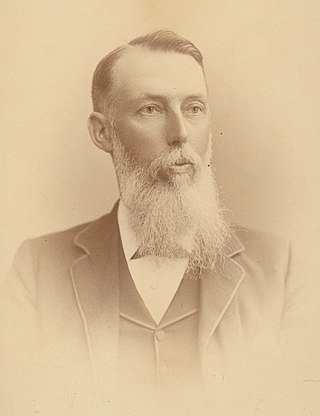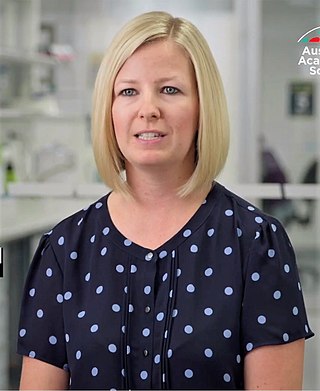
The Royal Society of Chemistry (RSC) is a learned society and professional association in the United Kingdom with the goal of "advancing the chemical sciences". It was formed in 1980 from the amalgamation of the Chemical Society, the Royal Institute of Chemistry, the Faraday Society, and the Society for Analytical Chemistry with a new Royal Charter and the dual role of learned society and professional body. At its inception, the Society had a combined membership of 34,000 in the UK and a further 8,000 abroad.

Denis James Evans is an Australian scientist who is an Emeritus Professor at the Australian National University and Honorary Professor at The University of Queensland. He is widely recognised for his contributions to nonequilibrium thermodynamics and nonequilibrium statistical mechanics and the simulation of nonequilibrium fluids.
Craig Jon Hawker is an Australian-born chemist. His research has focused on the interface between organic and polymer chemistry, with emphasis on the design, synthesis, and application of well-defined macromolecular structures in biotechnology, microelectronics, and surface science. Hawker holds more than 45 U.S. patents, and he has co-authored over 300 papers in the areas of nanotechnology, materials science, and chemistry. He was listed as one of the top 100 most cited chemists worldwide over the decade 1992–2002, and again in 2000–2010.
The Royal Australian Chemical Institute (RACI) is both the qualifying body in Australia for professional chemists and a learned society promoting the science and practice of chemistry in all its branches. The RACI hosts conferences, seminars and workshops. It is the professional body for chemistry in Australia, with the ability to award the status of Chartered Chemist (CChem) to suitably qualified candidates.
Martin Gerhardt Banwell is an organic chemist specialising in biotransformations and natural product synthesis.

Edward Henry Rennie was an Australian scientist and a president of the Royal Society of South Australia.

Francis Patrick John Dwyer FAA was Professor of Chemistry, Australian National University, Canberra. He was one of the most distinguished scientists Australia has produced. At the time of his death in 1962 he was widely recognised as a leading authority in inorganic chemistry, and had laid the foundation in Australia for a new field of research bridging science and medicine—biological inorganic chemistry. His influence as a teacher and as a researcher was widespread.
The Hector Medal, formerly known as the Hector Memorial Medal, is a science award given by the Royal Society Te Apārangi in memory of Sir James Hector to researchers working in New Zealand. It is awarded annually in rotation for different sciences – currently there are three: chemical sciences; physical sciences; mathematical and information sciences. It is given to a researcher who "has undertaken work of great scientific or technological merit and has made an outstanding contribution to the advancement of the particular branch of science." It was previously rotated through more fields of science – in 1918 they were: botany, chemistry, ethnology, geology, physics, zoology. For a few years it was awarded biennially – it was not awarded in 2000, 2002 or 2004.
Rennie is a surname and a given name. It may also refer to:
John Hamilton Bowie is an Australian scientist and academic, best known for his contributions to research in the fields of the chemistry of negative ions in the gas phase and of bio-active peptides in skin glands.
Michelle Louise Coote FRSC FAA is an Australian polymer chemist. She has published extensively in the fields of polymer chemistry, radical chemistry and computational quantum chemistry. She is an Australian Research Council (ARC) Future Fellow, Fellow of the Royal Society of Chemistry (FRSC) and Fellow of the Australian Academy of Science (FAA).
Martina Heide Stenzel is a Professor in the Department of Chemistry at the University of New South Wales (UNSW). She is also a Royal Australian Chemical Institute (RACI) University Ambassador. She became editor for the Australian Journal of Chemistry in 2008 and has served as Scientific Editor and as of 2021, as Editorial Board Chair of RSC Materials Horizons.
Vicki Gardiner is an Australian scientist who is the general manager of the Tasmania Division of Engineers Australia.
Maurice Stacey CBE FRS FRIC was a British chemist who worked alongside Sir Norman Haworth to artificially synthesize Vitamin C.
Robert Harold (Robin) Stokes FAA (1918–2016) was an Australian chemist and Foundation Professor of Chemistry at the University of New England, from 1955 to 1979. His research interests included solution thermodynamics and electrolytes.
Elizabeth Joy New is an Australian chemist and Professor of the School of Chemistry, University of Sydney. She won the 2018 Australian Museum 3M Eureka Prize.
Garry L. Rempel was a Canadian scientist specializing in chemical engineering, applied catalysis and polymer science, and known for his pioneering work on hydrogenation of nitrile rubbers. He was a professor at the University of Waterloo, Fellow of the Royal Society of Canada since 1992 and President of the Academy of Science of the Royal Society of Canada in 2001–2003. In 2015 he was created a Member of the Order of Canada.

Deanna Michelle D'Alessandro is an Australian chemist who is a Professor and Australian Research Council Future Fellow at the University of Sydney. Her research considers fundamental aspects of electron transfer in molecular coordination complexes and in nanoporous materials, and the development of metal–organic frameworks for environmental applications including carbon dioxide capture and conversion.

Debbie Silvester is a British-Australian chemist who is a professor at Curtin University. Her research considers electrochemical processes and sensing. She has explored room-temperature ionic liquids. In 2021, she was awarded the Australian Academy of Science Le Fèvre Medal.
Sean Smith is the director of NCI Australia with a conjoint position of professor of computational nanomaterials science and technology at the Australian National University (ANU).





